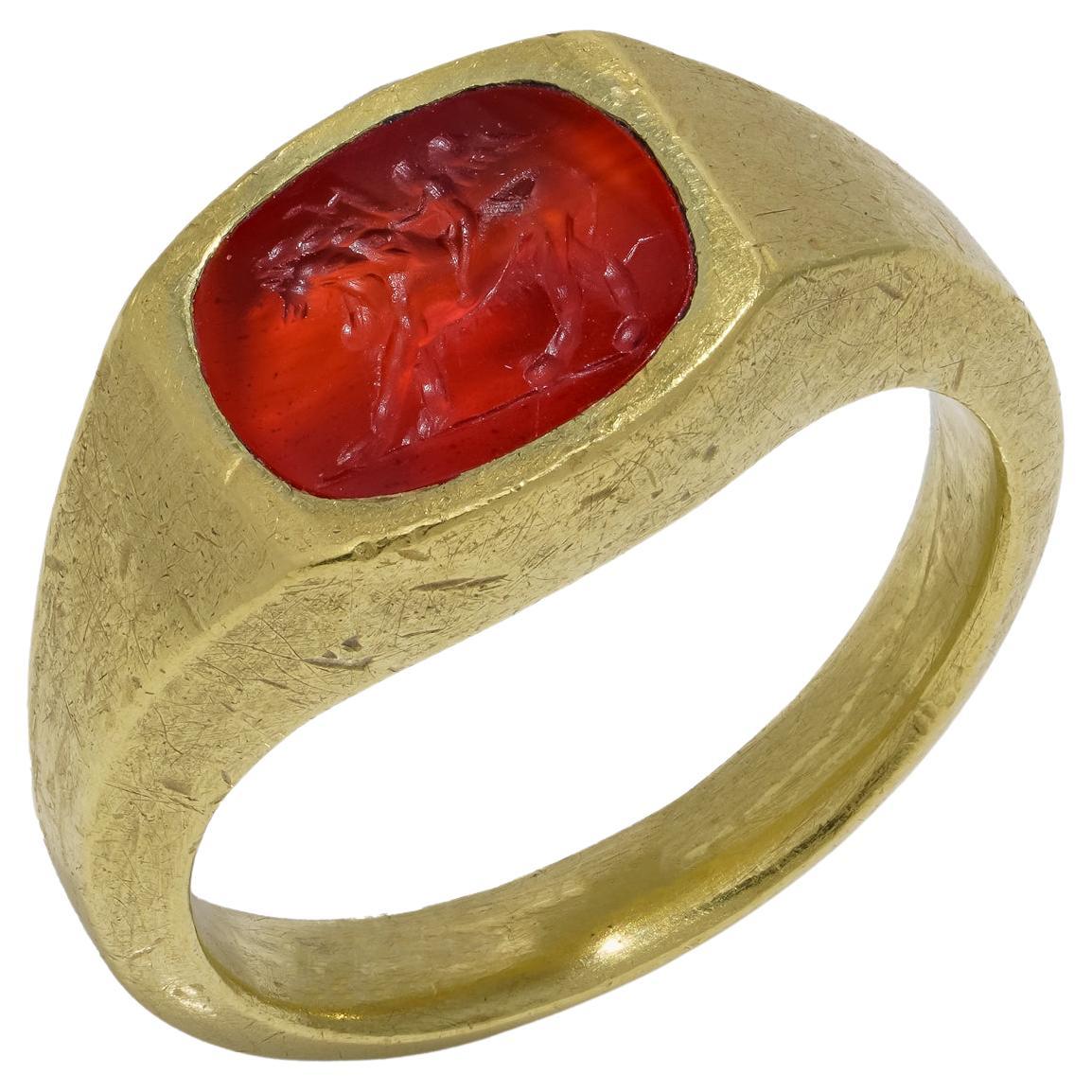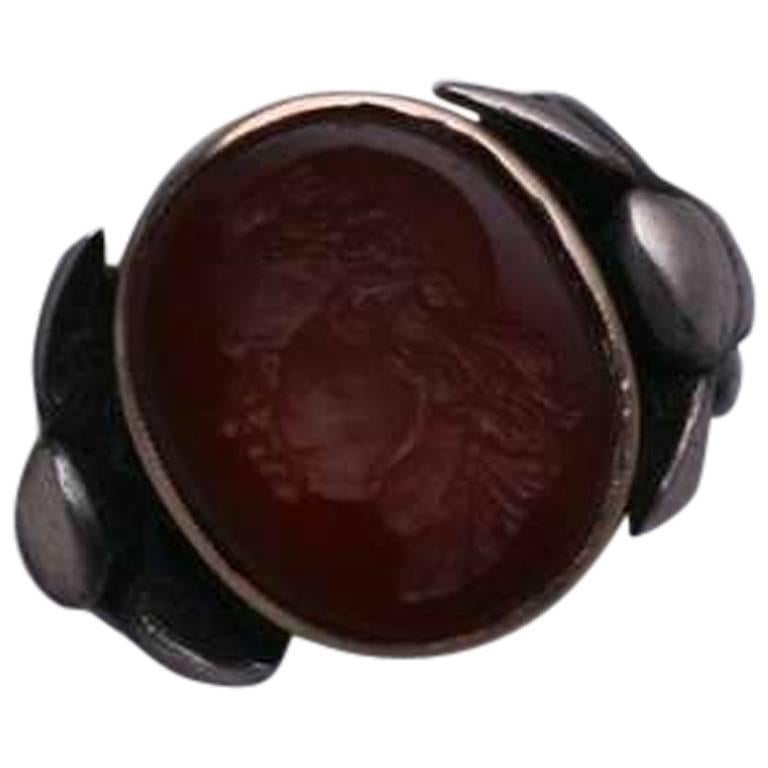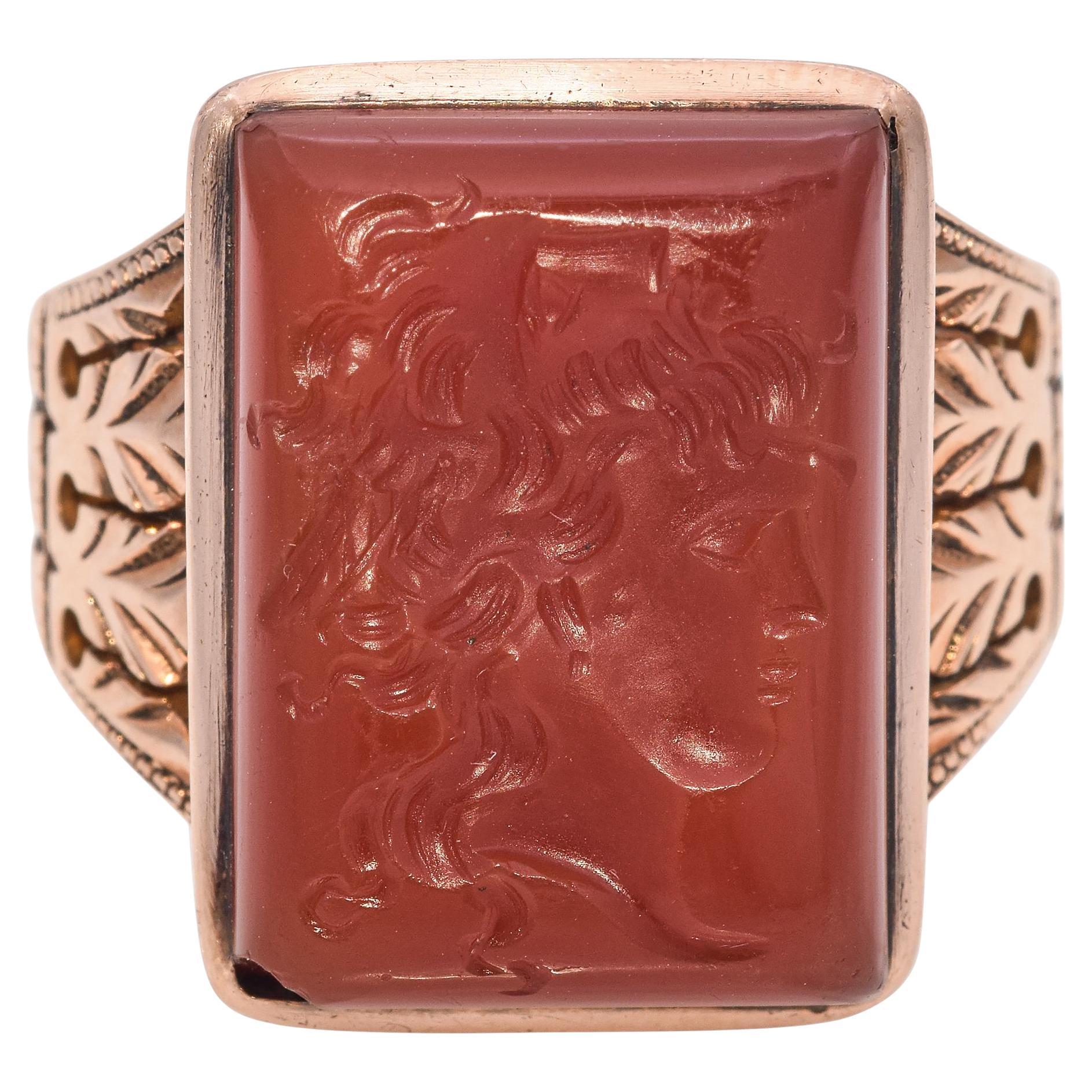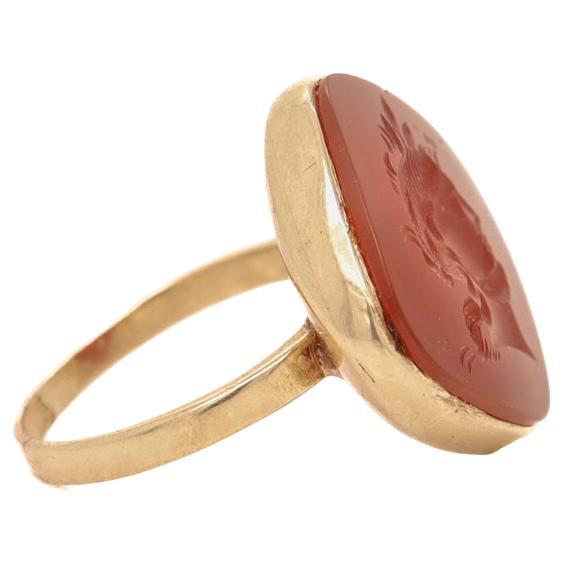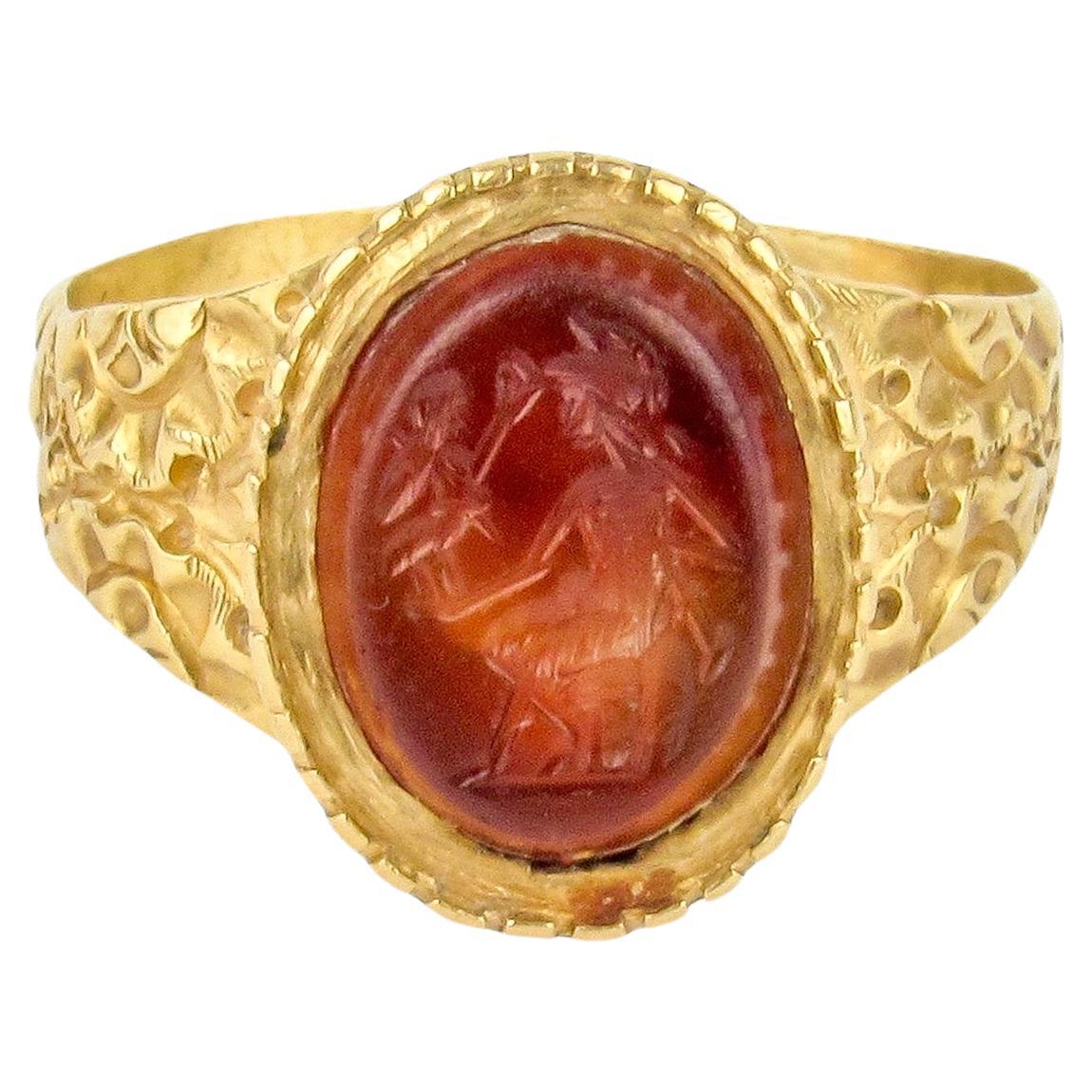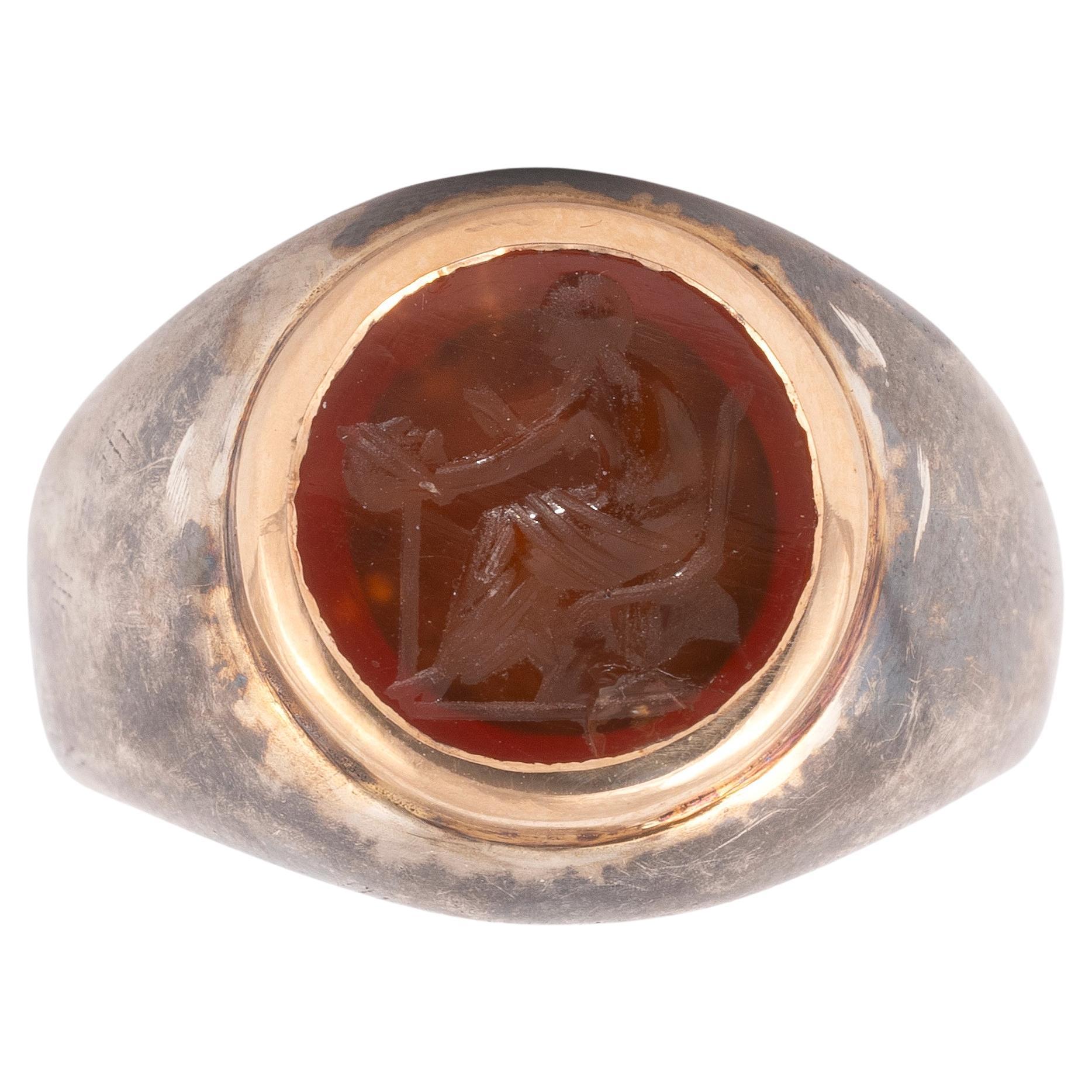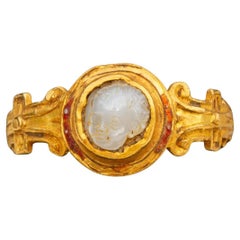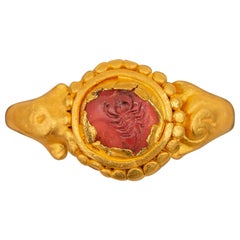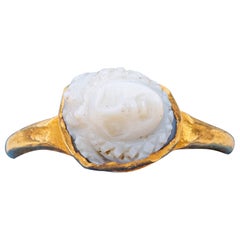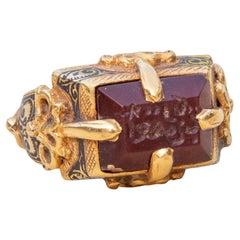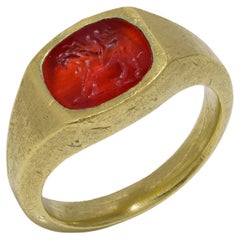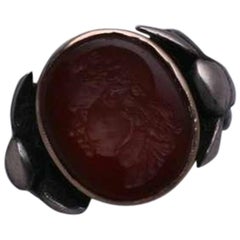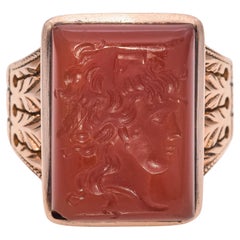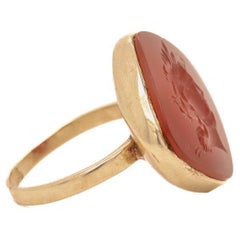Items Similar to Antique Gold Engraved Carnelian Cherub Eros Intaglio Ring Signet Ring
Want more images or videos?
Request additional images or videos from the seller
1 of 13
Antique Gold Engraved Carnelian Cherub Eros Intaglio Ring Signet Ring
$3,742.19
£2,750
€3,230.79
CA$5,141.13
A$5,739.58
CHF 3,007.46
MX$70,258.15
NOK 38,194.72
SEK 36,012.77
DKK 24,111.74
Shipping
Retrieving quote...The 1stDibs Promise:
Authenticity Guarantee,
Money-Back Guarantee,
24-Hour Cancellation
About the Item
A striking gold ring, dating from the early 20th century. The figural shoulders are adorned with angelic putti motifs, delicately sculpted to depict Eros, the Greek God of love and desire, who is often associated with Cupid in Roman mythology. These cherubic figures bring an air of romance and whimsy to the piece.
At the heart of the design is an oval intaglio, engraved in the ancient Roman style to portray Eros holding a torch. In classical iconography, the torch symbolises how love 'inflames the heart’.
The intaglio measures an impressive 18mm x 12mm, providing a bold focal point that complements the intricate detailing on the shoulders. The ring is stamped with a 375 hallmark for 9K gold and weighs 7.1 grams, offering a substantial feel when worn.
This unique piece is a UK size R (US size 8.5). It remains in very good condition.
- Ring Size:8.5 US, Not Resizable
- Metal:
- Weight:7.1 g
- Style:
- Period:
- Date of Manufacture:Unknown
- Condition:
- Seller Location:London, GB
- Reference Number:Seller: 101621stDibs: LU2845224962852
About the Seller
5.0
Vetted Professional Seller
Every seller passes strict standards for authenticity and reliability
Established in 2019
1stDibs seller since 2022
46 sales on 1stDibs
- ShippingRetrieving quote...Shipping from: London, United Kingdom
- Return Policy
Authenticity Guarantee
In the unlikely event there’s an issue with an item’s authenticity, contact us within 1 year for a full refund. DetailsMoney-Back Guarantee
If your item is not as described, is damaged in transit, or does not arrive, contact us within 7 days for a full refund. Details24-Hour Cancellation
You have a 24-hour grace period in which to reconsider your purchase, with no questions asked.Vetted Professional Sellers
Our world-class sellers must adhere to strict standards for service and quality, maintaining the integrity of our listings.Price-Match Guarantee
If you find that a seller listed the same item for a lower price elsewhere, we’ll match it.Trusted Global Delivery
Our best-in-class carrier network provides specialized shipping options worldwide, including custom delivery.More From This Seller
View AllRare Elizabethan 16th Century Gold Cupid Ring Renaissance Gold Ring Womens
Located in London, GB
This exquisite Elizabethan gold ring dates to the mid-16th century (c.1570) and features a circular bezel set with a high-relief cameo of Cupid, delicately carved in white chalcedony...
Category
Antique 16th Century Italian Renaissance Engagement Rings
Materials
Chalcedony, 22k Gold
Ancient Gold Amethyst Engraved Scorpion Ring Early Javanese Intaglio Ring
Located in London, GB
This scarce gold intaglio ring dates to the Indonesian Classical period, circa 8th–10th century.
The ring is crafted from high-karat gold (22K), featuring a circular bezel that holds an amethyst gemstone engraved with a scorpion motif. Scorpions were often considered symbols of protection in ancient traditions, aligning with Javanese beliefs that rings possessed magical properties to bring good fortune and guard against harm.
The stirrup-shaped shoulders, designed to mimic the form of water buffalo horns, are a hallmark of early Javanese craftsmanship. This distinctive design reflects both artistic expression and cultural symbolism rooted in Java’s agricultural and spiritual traditions.
Java, one of Indonesia’s largest islands, was a significant centre of civilisation and artistry during this period. Gold rings were not merely decorative but also served as currency, payment for fines, dowries, and even wedding feasts. Imported gemstones, like the present amethyst, were chosen for their astrological, magical, and medicinal properties, further enhancing their importance in Javanese society.
Referenced Examples:
Similar rings can be found in the Metropolitan Museum of Art (Accession No. 1998.544.298).
Additional examples are catalogued in Java Gold...
Category
Antique 15th Century and Earlier Engagement Rings
Materials
Amethyst, 22k Gold
Small Ancient Roman Medusa Carved Cameo Gold Ring 2nd Century Gem Carving
Located in London, GB
A scarce and small ancient Roman gold Medusa cameo ring, circa 2nd to 3rd century AD.
The carved layered onyx gemstone is white in colour and depicts the bust of Medusa engraved wit...
Category
Antique 15th Century and Earlier Italian Classical Roman Signet Rings
Materials
Onyx, Gold
Antique Gold Seljuk 12th Century Ring Carnelian Intaglio Kufic Islamic Signet
Located in London, GB
This incredible, rare gold ring dates from the 12th century Seljuk dynasty. The carnelian intaglio is set within a typical Seljuk tapered rectangular bezel with a four-pronged gold setting soldered to the outside of the bezel. Applied and pierced arabesque designs are placed at the bottom of each prong which also reinforce the joints.
Further applied gold Seljuk ornamentation decorates the band, including two gold birds and a highly decorative vestigial sprued bottom (back-knob) from the casting. The gold mount itself is also ornately and intricately chased and nielloed with arabesque patterns. Remarkably, the niello work remains in exceptional condition, and can still be seen on the underside of the bezel which is decorated with a lattice pattern.
The carnelian intaglio seal is flat cut base with bevelled sides. This shape was predominantly used in the seals from the 8th to 11th century. The seal is engraved with angular Kufic script with forked terminals which dates the seal to the 9th-12th centuries (Porter, 2011).
For similar referenced examples in museums and notable collections, see final photos, in particular item 26 in ‘Islamic Rings and Gems: the Benjamin Zucker Collection’ (1987).
UK size K, US size 5.25
The ring weighs 9.19 grams and is crafted in high-karat gold (21K gold). The carnelian stone measures 11mm x 8mm x 3mm. The hollow box bezel measures 16mm x 10mm and protrudes 7mm from the base.
This museum-grade ring is a rare survivor, most existing examples have some damage to the ring, intaglio or niello - this is a scarce example in superb, original condition.
The Seljuks, a Turkish dynasty of Central Asian nomadic origins, became the new rulers of eastern Islamic lands following the defeat of the powerful Ghaznavids at the Battle of Dandanakan (1040). Under the Seljuk sultanate, which spanned from the 11th to the 13th century, goldsmiths and jewellers created works of unparalleled beauty and sophistication. Seljuk jewellery...
Category
Antique 15th Century and Earlier Engagement Rings
Materials
Carnelian, Gold
Small Ancient Indus Valley Bead Ring Etched Carnelian Cone Antique Gold Ring
Located in London, GB
A superb and rare ancient Indus Valley etched carnelian bead ring. The conical shaped carnelian gemstone in the centre dates from the middle of the third millennium BC. Deep orange in colour with white patterned etchings, these beads originate from the Indus Valley civilisation (parts of modern day Pakistan and India).
These carnelian beads were alkaline-bleached to develop the geometric white patterns visible on the exterior. The technique was first developed by the Harappans of the Indus Valley civilisation, and vast quantities have been found in archaeological sites all across the Indus Valley.
The conical stone has been set in a later high-karat gold ring mount, the hoop is hollow and of circular cross section which widens towards the bezel. This design and shape is typical of ancient gold rings...
Category
Antique 18th Century Indian Signet Rings
Materials
Carnelian, Gold
Antique Gold Cameo Ring Greek Theatre Mask Silenus Hardstone Intaglio Signet
Located in London, GB
A very unusual antique gold ring set with a carved brown and white hardstone cameo depicting the theatrical comic mask of Silenus, the Greek mythological old rustic god of wine-making and drunkenness. The ring was made in the late 19th century and carries French control marks for 18K gold, whilst the cameo is probably Italian and made slightly earlier, circa 1800.
Silenus was a companion to the wine god Dionysus, and suitably he was a notorious consumer of wine, usually drunk and supported by satyrs or carried by a donkey. Silenus was described as the oldest, wisest and most drunken of the followers of Dionysus, and was said to possess special knowledge and the power of prophecy when intoxicated. He presides over the other satyrs and is related to musical creativity, prophetic ecstasy, drunken joy and drunken dances.
Silenus was usually depicted as a jovial old man, bald yet bearded, with a pot-belly, thick lips and snub-nose. The masks worn to play him in theatre really emphasised these features, as you can see with this cameo carving
Theatre was a key part of ancient Greek culture. The theatrical masks worn by the actors, known as ‘prosopon’, served various purposes. They enabled individual actors to play multiple roles (or genders) in the same performance; the exaggerated expressions helped define the character being portrayed; they helped spectators in the back rows to tell the characters apart. This particular masked as mentioned before is a comedic Silenus, please see final photo for other examples of Silenus masks in museum collections.
UK size N 1/2, US size 7
4.84g 18K gold
French ‘tête...
Category
Antique Early 19th Century Italian Georgian Signet Rings
Materials
Agate, 18k Gold
You May Also Like
Roman carnelian intaglio with Cupid riding a Lion mounted in 22kt gold
Located in Braintree, GB
This antique signet ring features a Roman carnelian intaglio depicting Cupid riding a lion. The intaglio is set in a 22kt gold shank, and the shank of the ring dates to the 19th cent...
Category
Antique 15th Century and Earlier European Classical Roman Signet Rings
Materials
Carnelian, Gold
Antique Carnelian Intaglio Ring, Louis VIII
Located in New York, NY
Antique Carnelian Intaglio Ring from the mid to late 19th Century. Intricately and finely carved seal of a Louis VIII profile within a gold bez...
Category
Antique 1870s French Victorian Signet Rings
Materials
Carnelian, 14k Gold, Sterling Silver
Antique Victorian Yellow Gold Carnelian Intaglio Signet Ring
Located in New York, NY
Exuding timeless elegance, this striking ring features a rectangular Carnelian intricately carved with a rare double head. The stone is set in a warm, gold-toned band adorned with de...
Category
Antique Mid-19th Century Signet Rings
Materials
Carnelian, Yellow Gold
Antique Gold & Carved Carnelian Intaglio Signet Ring with an Ancient Roman Hero
Located in Philadelphia, PA
A fine antique intaglio ring.
Likely converted from an antique button or pin.
In 14k gold
With a carved carnelian cabochon depicting an unidentified Roman hero.
Marked 14k to the...
Category
20th Century Etruscan Revival Signet Rings
Materials
Carnelian, Gold
Early 22k Carnelian Intaglio Ring of Jupiter Holding Victory
Located in Hummelstown, PA
Early carnelian intaglio depicts Jupiter seated holding Victory
Measurements: 16mm north to south, intaglio 12 x 9mm
Weight: 5.6 grams
Size: 8 3/4
Category
Antique 1820s Signet Rings
Materials
Carnelian, 22k Gold
Roman Carnelian Actor Intaglio Set Silver And Gold Ring circa 2nd Century A.D
Located in Firenze, IT
Round intaglio in orange carnelian depicting a seated man holding a mask (probably an actor).
Roman art, 2nd - 3rd century.
Top size 12mm
Blackened silver and 18kt Yellow Gold Rin...
Category
Antique 15th Century and Earlier Italian Classical Roman Signet Rings
Materials
Carnelian, Gold, 18k Gold, Yellow Gold, Silver
More Ways To Browse
Antique Greek Rings
Signet Ring Engagement
Antique Intaglio Rings
Antique Intaglio Gold Ring
Cupid Jewelry
Carnelian Intaglio
Greek Intaglio
Oval Carnelian Ring
Antique Carnelian Ring
Ancient Carnelian
Roman Intaglio Ring
Ancient Intaglio Ring
Intaglio Carnelian Ring
Ancient Roman Signet Ring
Ancient Roman Intaglio
Antique Signet Intaglio
Greek God Ring
Roman Carnelian
